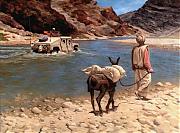Few could fail to be impressed by the speed and style of the US dominated Coalition victory over Saddam’s forces in Spring 2003. At the time, it appeared, to sceptics and supporters alike, that the most ambitious military action in the post Cold War era had paid off, and there was an air of heady expectation of things to come. Much of the credit lies rightly with the US Army, which seemed entirely attuned morally, conceptually and physically to the political intent it served.
In contrast, 2 years later, notwithstanding ostensible campaign successes such as the elections of January 2005, Iraq is in the grip of a vicious and tenacious insurgency. Few would suggest Operation Iraqi Freedom (OIF) has followed the path intended by the US President when he committed US forces. Pentagon and other Administration staff acknowledge that a moment of opportunity was missed immediately after the toppling of Saddam’s regime: that fleeting chance to restore law and order, maintain the momentum, nurture popular support and thus extinguish the inevitable seeds of insurgency sown amongst the ousted ruling elite. Today, the Coalition is resented by many Iraqis, whilst analysis of attack trends since mid 2003 shows that Coalition forces formed the bulk of the insurgents’ target set throughout 2004. In short, despite political and military leaders’ justifiable claims of achievement against tough odds, others claim, justifiably on the face of it, that the Coalition has failed to capitalise on initial success.
This change in fortune has been attributed to many factors. The Iraq undertaking was, in any case, ‘forbiddingly difficult’ and might not have seemed as appealing had the US forces not recently achieved a sudden and decisive victory over Taleban forces in Afghanistan. Inadequate attention was paid to planning for OIF Phase 4, including Security Sector Reform (SSR), arising in part, according to at least one source, from frictions in the Administration. The CPA decisions to disband the senior levels of the Baath Party and the entire old Iraqi Army, thus effectively disenfranchising those most likely to resent the new order, have also attracted much criticism. Some argue, however, that the Coalition military, particularly the US Army, were partly to blame, citing aspects of their performance since the cessation of formal hostilities and commencement of Phase 4 of the operation. Indeed, some serving US Army and DOD personnel acknowledge that whilst the Army is indisputably the master of conventional warfighting, it is notably less proficient in the Phase 4 type of role, or what the US defence community commonly calls Operations Other Than War (OOTW). The crux of the debate is whether the performance and approach of the US Army have indeed been contributory factors in the deepening crisis in OIF Phase 4, and, if so, what that means for the future development of the Army, particularly given that it has already embarked on a process of transformation. OIF is a joint venture, and dedicated, courageous Americans from all 4 Services and the civil sector risk their lives daily throughout Iraq, but the Army is the pivotal, supported force, and thus the most germane to the issue.
My motivation to study this has arisen from my experience serving with the US Forces in Iraq throughout 2004. There can be few acts more galling than a soldier from one country publicly assessing the performance of those from another. However, this is not an arrogant exercise in national comparisons: there is no other Army in the world that could even have attempted such a venture. It is, rather, an attempt to understand and rationalise the apparently paradoxical currents of strength and weakness witnessed at close hand over the course of a year. Ultimately, the intent is to be helpful to an institution I greatly respect...







Bookmarks